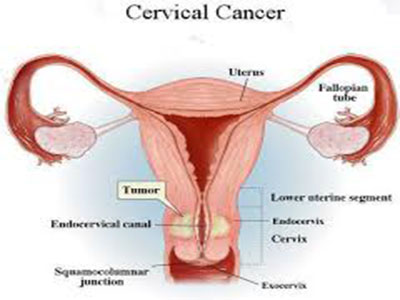



Cervical Cancer
Cervical cancer occurs when abnormal cells on the cervix grow out of control. The cervix is the lower part of the uterus that opens into the vagina. Cervical cancer can often be successfully treated when it\'s found early. It is usually found at a very early stage through a Pap test .
Cervical cancer is one of the most common cancers in women worldwide. But in the United States and other countries where cervical cancer screening is routine, this cancer is not so common.
Most cervical cancer is caused by a virus called human papillomavirus , or HPV. You can get HPV by having sexual contact with someone who has it. There are many types of the HPV virus. Not all types of HPV cause cervical cancer. Some of them cause genital warts , but other types may not cause any symptoms.
Most adults have been infected with HPV at some time. An infection may go away on its own. But sometimes it can cause genital warts or lead to cervical cancer. That\'s why it\'s important for women to have regular Pap tests. A Pap test can find changes in cervical cells before they turn into cancer. If you treat these cell changes, you may prevent cervical cancer.
Abnormal cervical cell changes rarely cause symptoms. But you may have symptoms if those cell changes grow into cervical cancer. Symptoms of cervical cancer may include:
- Bleeding from the vagina that is not normal, such as bleeding between menstrual periods, after sex , or after menopause .
- Pain in the lower belly or pelvis.
- Pain during sex .
- Vaginal discharge that isn\'t normal.
Your doctor may also do a Pap test and take a sample of tissue ( biopsy ) if you have symptoms of cervical cancer, such as bleeding after sex.
Our Vision...
I believe in using the foreces of nature to create a medicine which utilizes these forces - applying scientific methods and adapting them in a natural way - to harm the body as little as possible. Hyperthermia fully meets this criteria
- 1
- 2
- 3
 Dr. James I. Bicher, M.D.
Dr. James I. Bicher, M.D.
Hadassah Medical School, Jerusalem, Israel
Member of National Committee on Hyperthermia. A Founder and Past President of the North American Hyperthermia Group (NAHG). Secretary and (1972-1981) President (1981) of International Society of Oxygen Transport of Tissue. Zondec Award, (Hadassah Medical School, Jerusalem), 1962. President and Founder of the American Society of Clinical Hyperthermia (ASCHO).
 Dr. Ralph S. Wolfstein, M.D.
Dr. Ralph S. Wolfstein, M.D.
University of Michigan
Former, "Acting Director, Department of Radiation Therapy Nuclear Medicine: at Cedars - Sinai Medical Center. Member in Society of Nuclear Medine, Charter Member in American College of Nuclear Physicians. Member of American Society of Therapeutic Radiology and Oncology. Member of Radiation Research Society. Charter Member of International Clinical Hyperthermia Society.
 Dr. David Bell, M.D.
Dr. David Bell, M.D.
Tulane University School of Medicine, New Orleans
PhD in mathematics from, "Brown University".Community Hospital, Long Beach, CA - Medical Director of Radiation Oncologist. Board Certified, Society Member of, "PHI BETA KAPPA & SIGMA XI".
